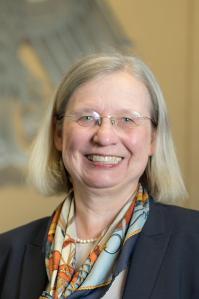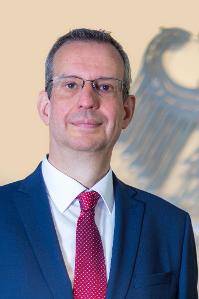Use of cookies
Cookies help us to provide our services. By using our website you agree that we can use cookies. For more informations about Data Protection visit the following link: Datenschutz
The Federal Patent Court is headed by the President, who is assisted by the Vice-President. The judges exercise their judicial function within the Court’s various boards. All non-judicial activities are assigned to the Court Administration, which is subdivided into divisions. As a rule, the head of these divisions is qualified as a judge.

May 2021 - present: President of the Federal Patent Court
10/2012 - 04/2021 : Head of Division 4 “Administration and Law” at the German Patent and Trade Mark Office
01/2011 - 09/2012 : Head of the Legal Division at the German Patent and Trade Mark Office
2000 - 2010 : Judge and Head of Division at the Federal Patent Court
1994 - 2000 : Judge at the Local Court of Munich
1993 : Doctorate in law (Dr. jur.)
1992 - 1993 : Public prosecutor at the Munich Regional Court I
1991 - 1992 : Officer in the Bavarian State Chancellery, Public Relations Department
1989 - 1991 : Judge at the Munich Regional Court I, Press Chamber
1986 - 1989 : Legal trainee in Munich
1981 - 1986 : Studied law at the Ludwig-Maximilians-Universität in Munich, training as a journalist
1981 A-levels in Munich
Born on January 18, 1963 in Munich. Mother of 2 daughters.

Apr. 2025 - present : Vice-President of the Federal Patent Court
Nov. 2017 - present : Presiding judge of a Technical Board of Appeal at the Federal Patent Court - since Jan. 2024 Presiding judge of an additional Technical Board of Appeal
Nov. 2017 - present : IT Officer of the Federal Patent Court
01/2013 - 12/2019 : Head of Division 4 "Information Technology" of the Federal Patent Court
2011 - present : Employed in the IT area and in Division 4 "Information Technology" of the Federal Patent Court
07/2010 - 10/2017: Judge at the Federal Patent Court as a technical member of a Technical Board of Appeal
07/2009 - 07/2010: Judge by assignment at the Federal Patent Court in a Technical Board of Appeal
02/2001 - 07/2009: Member of the German Patent and Trade Mark Office (DPMA) as patent examiner and later as team leader, active in various IT projects
12/1992 - 01/2001: Employed in the electricity industry, including as head of department and division at Bayernwerk AG and E.ON Energie AG
Pictures: Federal Patent Court, Katrin Sander
The Federal Patent Court adjudicates in a total of 22 boards (as of 1st April 2025):
1 juridicial board of appeal, 6 nullity boards, 8 technical boards of appeal, 4 boards of appeal for trade marks, 1 board of appeal for trade marks and designs, 1 board of appeal for utility models, and 1 board of appeal in plant variety cases.
As of 31st December 2024, the Federal Patent Court had a total of 88 member judges. This group consists of 27 female and 61 male judges, of whom 49 trained in technical and scientific fields, while 39 have an educational background in law.
A particular feature of the Federal Patent Court within the German court system is that its adjudicating boards are comprised of both lawyers and scientists, i.e. technically qualified judges. Like the legally qualified members, these scientists are professional judges appointed for life, with all the rights and duties of a professional judge. The technically qualified judges participate in all proceedings that concern (at least in part) the properties of a technical invention – for example, in proceedings relating to the grant or revocation of a patent, or in cancellation proceedings relating to utility models. In trade mark proceedings, on the other hand, the adjudicating boards are composed entirely of legally qualified members.
Depending on the type of proceedings, the boards sit in a composition of three, four or five judges.
In addition to the adjudicative boards, the Court Administration is a vital component of the Federal Patent Court. It is responsible for all of the Court's tasks beyond its adjudicative function.
The Court Administration is comprised of 6 divisions, each of which is headed by a judge or a civil servant of the senior service and staffed by civil servants and public employees.